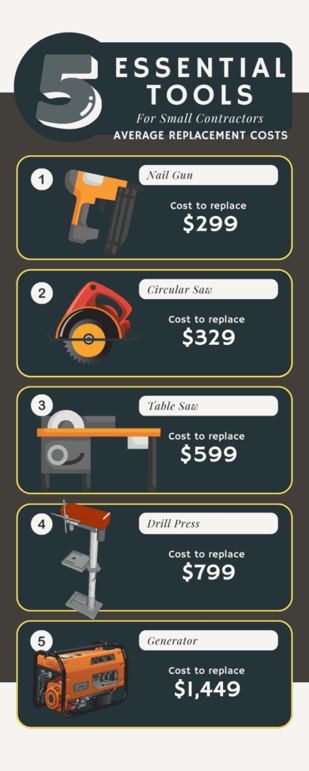Appropriate Tool Insurance for Small Contractors
August 29th, 2025
3 min read

Your tools represent years of investment and form the foundation of your contracting business. When a tile saw breaks down mid-project or hand tools disappear from a job site, you face both immediate work delays and unexpected replacement costs.
Many small contractors in Central New York assume their existing insurance covers their tools, only to discover after a loss that business equipment receives limited or no coverage under personal policies. Others believe their general liability policy includes tool coverage, which typically isn't the case.
At the Horan insurance agency, we work with contractors throughout Central New York to explore coverage options for their business tools and equipment. We can discuss different carriers and policy structures that address the unique needs of various trades.
This article covers when tool insurance becomes necessary for your business, common misconceptions about existing coverage, and how to structure appropriate coverage for your equipment.
Understanding When Tool Insurance Benefits Your Business
Few small contractors have a plan in place for their equipment and tools in case of theft or fire before the job is completed.
The problem is that that type of loss happens at the most financially inopportune time imaginable—like when you’re a third of the way in on a large project—and leaves you scrambling for a solution.
Like many contractors, you accumulated your tools over time. Makes sense. You add to your collection of tools and equipment as you can afford it or as unique ones are needed to complete certain jobs.
We’ve yet to meet a contractor who went out and purchased $50,000 worth of tools the same day they ordered their starter set of business cards from VistaPrint.
Yet, after a loss like a fire, $50,000 worth of tools can be gone in a moment, leaving you to replace them one by one.
Tool insurance becomes valuable when you've accumulated equipment that would create financial strain to replace all at once. Consider coverage when your total tool investment reaches an amount that would significantly impact your business operations if lost.
Rather than face the challenge of replacing thousands of dollars in tools after a loss, tool insurance can help cover replacement costs, allowing you to maintain your business operations.
Common Misunderstandings About Existing Tool Coverage
From our experience, one of the main reasons why contractors hold off on getting insurance for their tools is because they incorrectly assume their home or renters insurance policy will pay for those tools in the event of a loss.
The truth is, any of your possessions that are used to generate income are excluded from coverage on most personal insurance policies or have extremely limited coverage at best.
Others believe that their tools are included as part of their business liability policy.
Many well-meaning contractors learned the hard way that it isn’t so. General liability does not insure any of your possessions, tools, computers, or other equipment.
Some carriers will allow you to add a property coverage element to a general liability policy.
If you have a general liability policy but have never been asked about the value of your tools, it’s fair to say that you’re not insured for any loss associated with those tools.
That's why reviewing your current coverage with a licensed agent helps ensure you understand what is and isn't covered by your existing policies.
How to Structure Coverage for Your Tools and Equipment
 Structuring coverage for your tools begins with knowing how much they're all worth. Knowing their value is the first step.
Structuring coverage for your tools begins with knowing how much they're all worth. Knowing their value is the first step.
The next step is to determine the right policy to add them to. Should you include the tools on your liability policy? Or is it better to start a separate one?
Adding tools to your existing business liability policy often provides the most efficient coverage structure.
Tool insurance can help address replacement costs if equipment goes missing during a project. Rather than using personal financial resources to replace expensive tools after a loss, coverage may help with these unexpected expenses.
Each trade uses different tools and equipment. A flooring contractor has different coverage needs than a landscaper. We can discuss methods for determining appropriate coverage amounts for your business essentials.
We covered when tool insurance becomes valuable for contractors, common misconceptions about existing coverage, and how to structure appropriate protection for your equipment. Tool coverage can help address replacement costs when equipment is stolen, damaged, or destroyed, reducing the financial impact on your business operations.
Without coverage, you bear the full cost of replacing tools and equipment after a loss. This could mean delays in completing projects, impacts to cash flow, or the challenge of finding quality replacement equipment quickly. Tool insurance provides a way to transfer some of these financial risks.
The Horan insurance agency works with contractors throughout Central New York to explore coverage options from different carriers. We can discuss policy structures that address the unique needs of various trades and help you evaluate whether tool coverage fits your business situation.
Click the Get a Quote button below to discuss tool insurance options for your contracting business.
To learn about another vital policy for your business, read Why Must CNY Contractors Have Workers Comp Insurance?
Daniel is an accomplished content creator. He has been working in publishing for almost two decades. Horan Companies hired Daniel as its content manager in November 2022. The agency entrusted its messaging to him. Since then, Daniel has written insurance articles, service pages, PDF guides, and more. All in an effort to educate CNY readers. He's helping them understand the world of insurance so they can make informed decisions.
Topics:


























